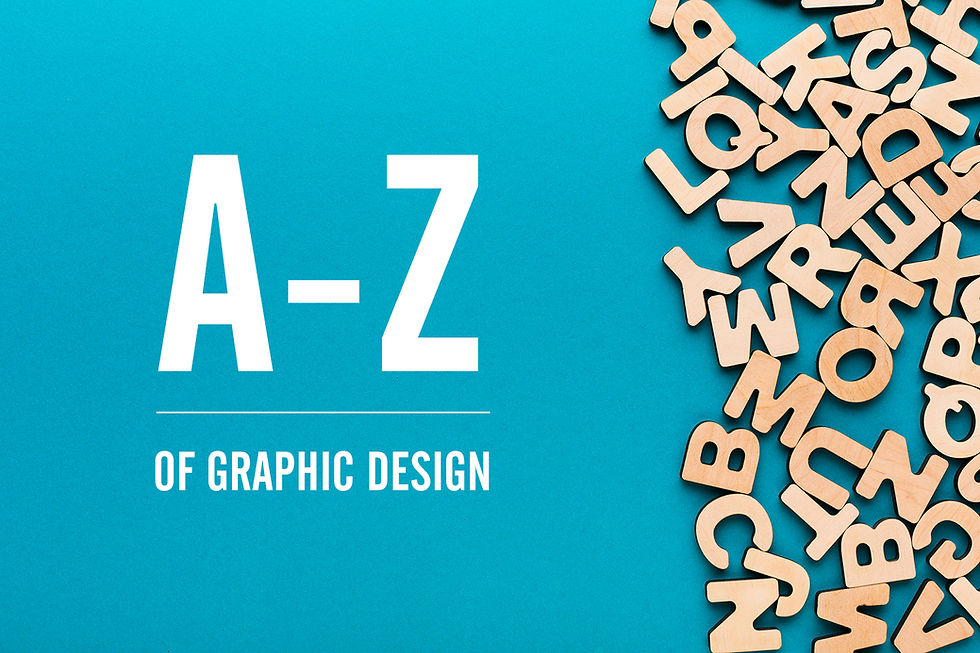The A-Z of Graphic Design
- Helene Clara Gamper

- Oct 28, 2019
- 4 min read
In this blog article, I’ll show you the A to Z of a graphic designer’s daily routine (or my routine). Enjoy ;-)

A …. like Adobe. The US software giant has been setting the benchmark in the graphic design industry for years, with programs like Photoshop, Illustrator and more.
B …. like briefing; probably the most important and most detailed talk between the client and the designer/agency, which serves as the basis for any upcoming design work.
C …. like copyright. Copying logos is an absolute no-go and can cost companies a lot of money. Here you find out more about a sincere case.
D …. like digital publishing. Nowadays, it might be a really good idea to offer innovative rich media magazines as an app. I work with the Belgian software solution Twixl for this purpose.
E …. like editorial design. Designing print products like brochures and magazines is part of my regular business.
F …. like flat design, which can be seen everywhere since Windows 8. In this blog article from 2014, that was also featured on marketingfish.de, I talk about the flat design trend (even though it was five years ago, it’s still relevant today) > the article is available in German language only.
G …. like gifographic. A gifographic is a gif-animated infographic and can be used in many different ways.
H … like hand-lettering, the art of drawing letters by hand. In a typography workshop conducted by Vienna-based Typejockeys, organised by WEI SRAUM Innsbruck, I made my first steps in drafting and drawing letters of my own font.


I …. like Indesign; a software to design great print products (brochures, magazines, flyers, business cards etc.) - of course by Adobe.
J …. like jpg; the probably most common picture format for pixel-based images. If you don’t want to have pixels, please scroll down to the letter V.
K …. like kerning; a term in the world of micro-typography to visually balance out the gaps between letters (example: AV instead of A V).
L …. like logo; a symbol representing an organisation. By the way: Here you see 8 things that make a good logo.
M …. like mindmap; a great tool to sort thoughts and let your ideas flow into different directions.
N …. like notepad. Every logo idea and logo draft gets brought down onto paper with a pencil. This allows for a maximum of flexibility and your creativity is really "flowing".
O …. like opacity; a term in the printing industry. A paper’s opacity indicates how much the printed backside of a page is visible through the front of the same page. You don’t see any of the text on the backside of a page shining through, when paper with good opacity is used. Here you can find more information on paper selection for magazines.
P … like Pantone. Pantone color fans are crucial for a continuous color system across various communication materials. The Color Bridge fans in particular have really proven to be very handy when working for print and digital purposes (like I do). See more about it here.
Q … like questionnaire. In the course of the briefing, a set of specific questions should be asked. To find out what kind of questions I ask my clients in the course of the briefing, head over to point 5 of this interview.
R … like RGB. The RGB color mode consists of the colors red, green and blue (RGB). All three colors have a value range from 0 to 255, which means that there are maaaaany different color possibilities. The RGB color mode is used for everything digital, whereas the CMYK color mode (four cartridges) is used for everything printed.
S … like start-up. All newly found companies need a corporate design in order to professionally communicate with the outside world.
T … like typography, the world of fonts. Watch this video to see how powerful typography really is.
U … like UX/UI or "user experience / user interface" design. This is all about a possibly high user friendliness in the digital world (on websites and within apps).
V … like vector. A vector file ends with ai, eps or svg and does not have any pixels (unlike jpg files). Vectors are dots that are connected with lines. Thus, a vector file can never pixelate and can always be scaled up endlessly without any quality loss. This is one of the reasons why a logo must never be made in Photoshop.
W … like web design. I have been creating websites with WIX for many years. A good decision!
X … like Xcode. Xcode is a software to sign apps in order to deliver apps to app stores. When I work on app magazines, Xcode is an essential element in the background.
Y … like yellow Cyberduck. The yellow duck is a handy tool to transmit data via FTP servers.
Z … like Zoom. Zoom is a video conference software that I sometimes use for meetings with colleagues and business partners (a great alternative to Skype).



Comentarios